13 WhatsApp scams to know and avoid in 2024

WhatsApp is a great place to keep in touch with friends and family online. And while it’s generally a safe instant messaging service, there are scams on the app that you should be aware of. In this guide, you'll learn about different types of scams that you might experience from other users of WhatsApp – we’ll call them WhatsApp scams – and how to recognise and avoid them. Then, get a powerful mobile app that combines security and antivirus features to help protect against the variety of scams and threats you may come across online.
It’s difficult to keep track of new WhatsApp scams, especially when they use social engineering schemes to trick potential victims out of hard-earned cash. In this guide, we’ll deep dive into the most common types of WhatsApp scams to look out for.
Here are the some of the most common WhatsApp scams to know and avoid:
1. Loved one in need scams
It’s human nature to help a loved one in need, and scammers take full advantage of that. In this type of scam, a WhatsApp scammer pretends to be a close family member or friend with a new phone number. The scammer proceeds to use social engineering techniques, often asking for money to help with an emergency situation.
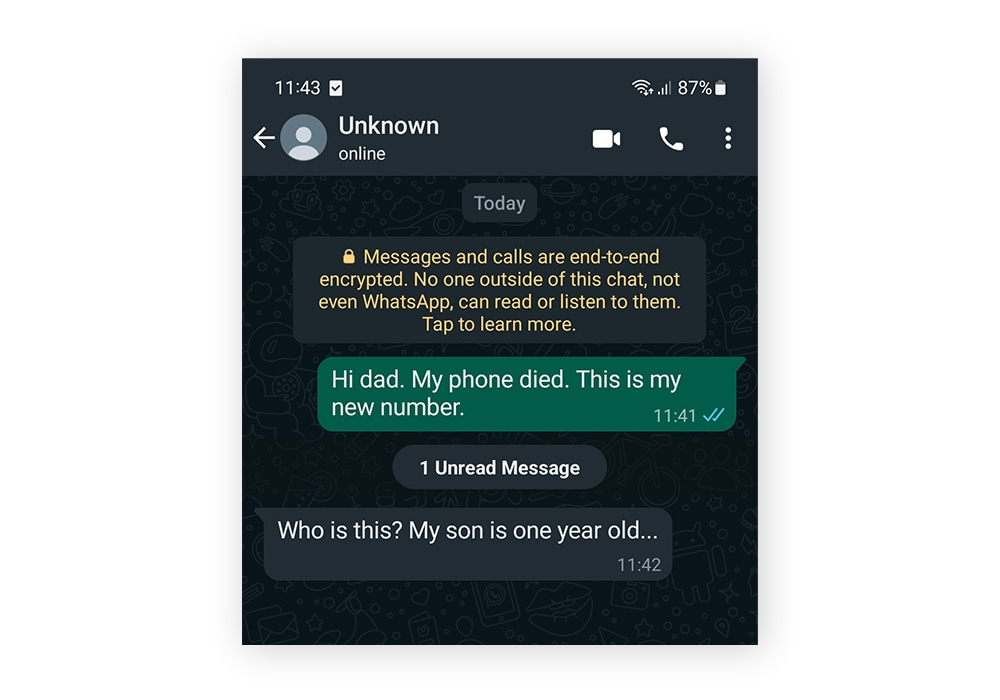
How to avoid loved one in need scams:
- Be wary of calls or texts from unknown numbers, and never send money to a person without confirming their identity first.
- Ask for the person’s old number or confirm who they say they are with a fact or memory that only they would know.
2. Gift card scams
Scammers also use WhatsApp for gift card scams. In this scam, the victim receives a text message claiming to be from a legitimate company, with a link to claim a supposedly free gift card. In reality, the link leads to a malicious website. Clicking the link can install malware on your device. Or you might be asked for personal information to “claim” your gift card — in reality, you are handing over sensitive information to a scammer.
How to avoid gift card scams:
- Never click a link from an unknown number, and be suspicious of any type of free gift card, giveaway, or other prize from out of the blue.
- Don’t enter personal details on any third-party website.
3. QR code scams
Similar to a gift card scam, in QR code scams, scammers use WhatsApp to send a QR code, asking you to scan the code to receive a prize. But, by following the scammer's instructions, you may end up giving them sensitive information that they can use for identity theft or to access your bank account.
How to avoid QR code scams:
- Do not click links or scan unrequested codes from an unknown number.
- Never share personal details on a third-party website.
4. Tech support scams
Scammers are pros at convincing victims to give out sensitive personal information by posing as someone else. Tech support scams involve scammers posing as WhatsApp customer service representatives. These “representatives” will ask you to verify your identity to help secure your account. But if you give these WhatsApp scammers your personal information, you’ll actually be making your account much less secure.
How to avoid tech support scams:
- Don’t share personal information with someone claiming to be a WhatsApp representative. Unless you initiate contact with WhatsApp customer service first, it’s probably a scam.
- Be on alert if you receive an unexpected message asking you to verify your account — this could mean that someone is trying to scam you or install spyware on your phone.
5. Unauthorised verification code scams
Two-step verification is designed to keep your account safe by requiring a second verification method — often a code sent to your phone or email. But a common WhatsApp scam involves someone claiming that they entered your phone number by mistake and need the code that has been sent to your phone to log in to their own account.
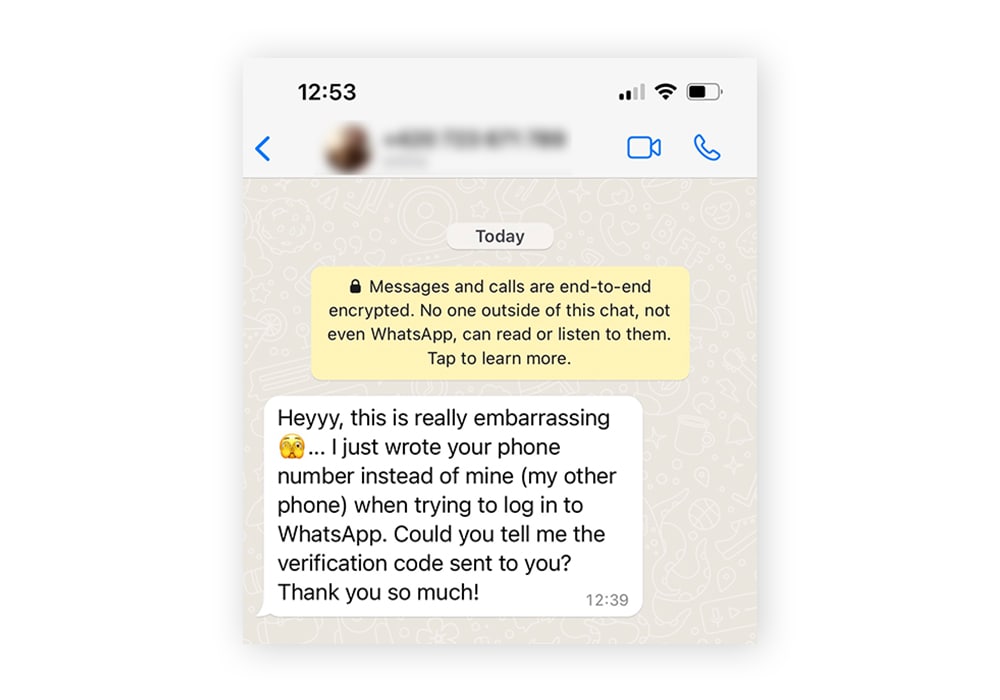
How to avoid unauthorised verification code scams:
- Never share a verification code with a third party.
- If you receive an unexpected account verification message, treat it as a hacking attempt.
- Immediately secure your account by changing your WhatsApp PIN and ensuring no unknown devices are linked to your WhatsApp account.
6. Lottery and prize draw scams
Lottery and prize draw scams are popular on WhatsApp and other social media platforms — for example, they can often be found as a type of Instagram scam. In this scam, you receive a message claiming you’ve won a lottery or prize draw. Usually the scammer also sends a link, asking you to open it to “claim” your prize.
How to avoid lottery and prize draw scams:
- Don’t follow a suspicious link in a WhatsApp message or on other social media platforms — it could infect your device with adware or prompt you for personal information.
- Treat any message about a lottery or prize draw as a red flag.
7. Cryptocurrency scams
In a cryptocurrency scam, a scammer contacts you promising a lucrative investment opportunity on WhatsApp. Once you pay in, you’ll supposedly receive a large return on your investment. But more often than not, the scammer will run off with your money without investing it at all.
How to avoid crypto scams:
- If it sounds too good to be true, it probably is — don’t trust anyone promising to make you rich.
- Don’t send money to anyone you aren’t familiar with, and never share payment information on a third-party website.
8. Romance scams
Catfishing is a classic social media scam that often takes place via WhatsApp after you meet a romantic interest on another app. The scammer builds up a romantic relationship with you over a matter of weeks, or even months, gaining your trust before asking for money or convincing you to share sensitive personal information.
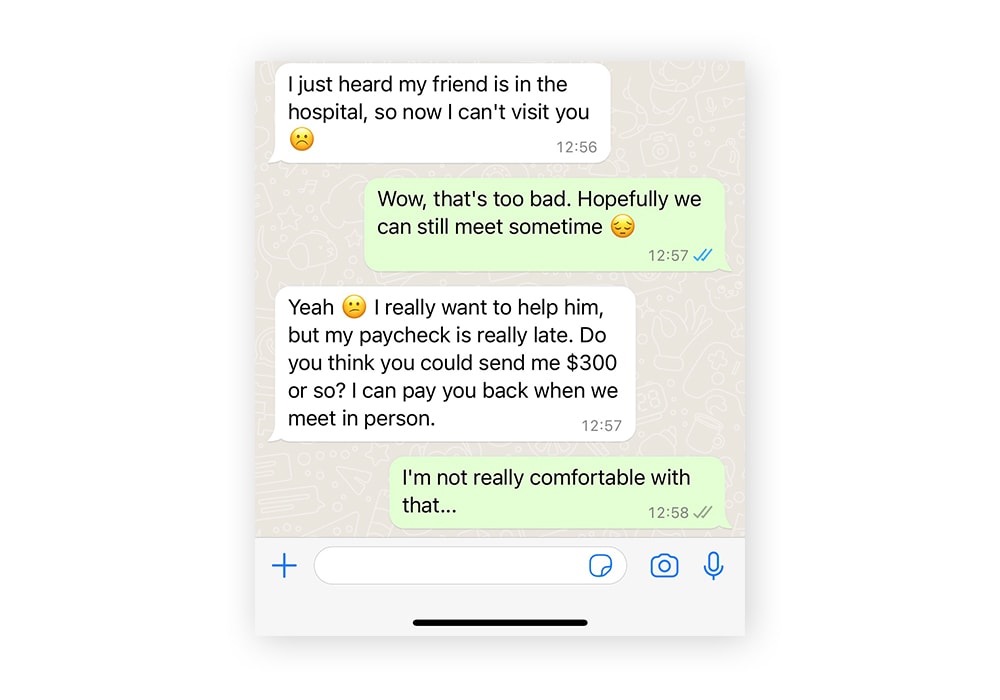
How to avoid romance scams:
- Avoid talking to people online whose profiles are clearly fake. Romance scammers often use stock images, have few connections or friends, and have very little activity connected to their profiles.
- Be wary about anyone asking you for money or personal information.
- Be skeptical of a romantic interest that refuses to meet in person or show their face in a video call — it could mean they’re lying.
9. Call forwarding scams
Similar to a vishing scam, a call forwarding scam starts with an unsolicited phone call. The scammer convinces you to call a number that, unbeknownst to you, enables call forwarding from your number to a new one that the scammer controls. While you’re engaged in the call with the new number, the attacker tries to sign into your WhatsApp account, selecting the option to send a one-time password via phone call, which is then forwarded.
How to avoid call forwarding scams:
- Be suspicious of any unsolicited phone calls from unfamiliar numbers.
- Don’t call numbers beginning with **67* or *405* — these are service requests to enable call forwarding from your phone number to a new one.
- If you suspect someone has hacked or is trying to hack your WhatsApp account, change your PIN and login settings immediately.
10. Incorrect number scams
Just like with other types of phishing, a scammer’s end goal with an incorrect number scam is to steal your personal information. The scammer “accidentally” calls or texts your number and strikes up a conversation, then uses social engineering tactics to persuade you to invest in their business.
How to avoid incorrect number scams:
- Block texts and calls from unfamiliar numbers and don’t continue a conversation with someone you don’t know, especially if the person asks you for money.
11. WhatsApp Gold scams
In a WhatsApp Gold scam, a scammer will send you a smishing text claiming that you’ve been invited to WhatsApp Gold, an exclusive version of WhatsApp. This “invitation” includes a link that takes you to a spoofed website or infects your device with malware.
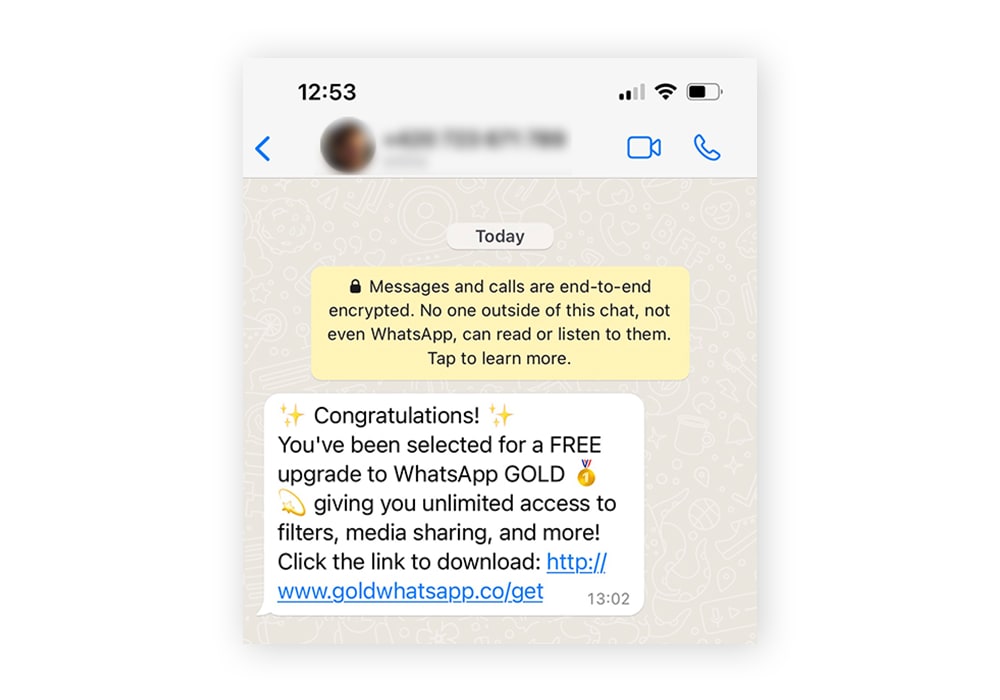
How to avoid WhatsApp Gold scams:
- Don’t click unsolicited, suspicious links in WhatsApp or text messages.
- Don’t share your personal information on third-party websites.
12. Voucher scams
In this WhatsApp scam, you receive a message from a scammer linking to incredible coupons or discount vouchers. But, following this link might infect your device with ransomware or other malware. The link might also lead to a spoofed website asking you to enter personal information to “claim” your coupons.
How to avoid voucher scams:
- Never follow a suspicious link or enter personal information on a linked website.
- Ignore and delete WhatsApp messages from numbers claiming to be well-known companies, unless you initiated the communication with them.
13. Charitable fraud scams
Scammers often trick victims into thinking they are giving money to a good cause by posing as a charity and asking for donations. While charities are often worthy causes, it is unlikely that a legitimate charity would ever randomly message you on WhatsApp. More likely, it’s a scammer trying to exploit your goodwill or gain access to your financial details — as was the case in these Covid-19 charity scams.
How to avoid a charity scam:
- Treat any unsolicited requests for money as a red flag — it’s likely just another internet scam.
- Don’t follow any unfamiliar links or share your personal information with anyone you don’t know and trust.
How to spot a WhatsApp scam
Although WhatsApp scams take numerous different forms, they often share similar characteristics. Here are the most common signs of a WhatsApp scam:
- Unsolicited text messages from unfamiliar numbers
- Messages urging immediate action
- Messages with spelling and grammatical errors
- Requests for money or personal information
- Messages with suspicious links or attachments
- Messages claiming you won a lottery, prize, gift, coupons, etc.
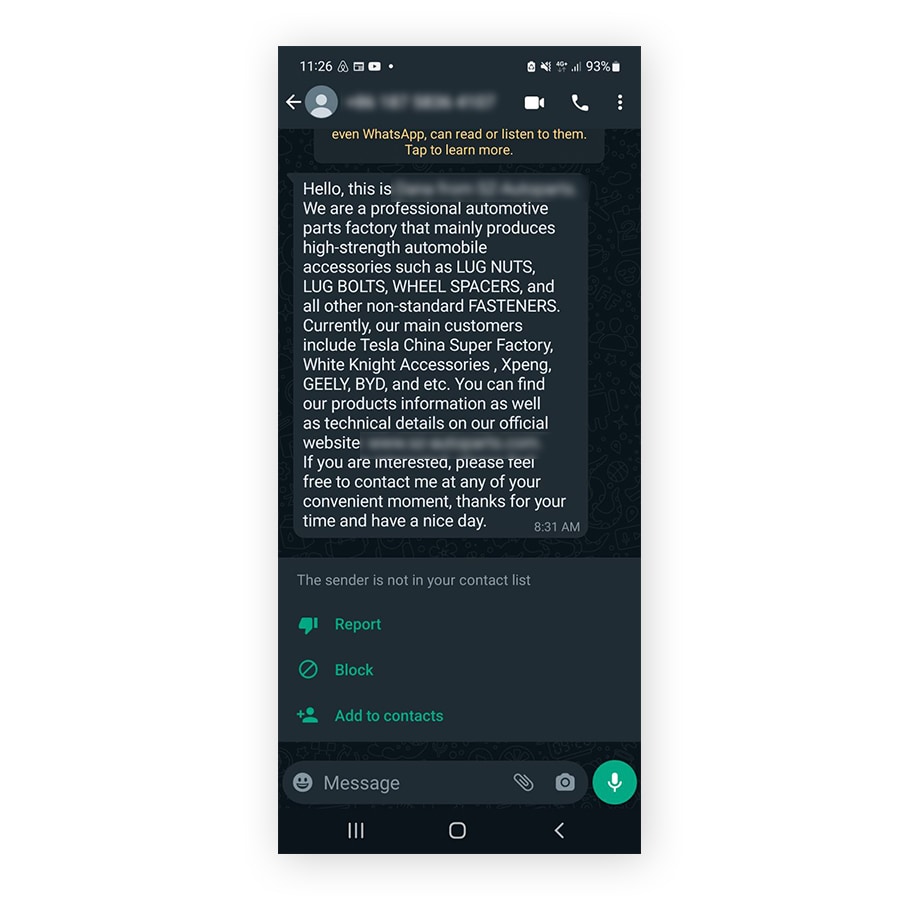
How to avoid WhatsApp scams: 5 protection tips
Once you recognise the telltale signs of a WhatsApp scam, they become easier to avoid, but there are some extra steps you can take to increase your security online and protect yourself against scammers:
- Enable two-step verification to reduce the risk of your account being hacked.
- Don’t follow suspicious links or download suspicious attachments.
- Ignore messages from unknown numbers and block further communication.
- Strengthen your password security and WhatsApp PIN to protect your account from hackers.
- Download powerful antivirus software to add an extra layer of protection and help you stay safe online.
A strong security app like Norton 360 for Mobile can help protect you against malware, spyware, ransomware, and other online threats that may accompany WhatsApp scams. Plus, it includes a built-in VPN to encrypt your internet traffic and help protect the personal information you send and receive online.
What to do if you’re scammed on WhatsApp
If you receive a WhatsApp message from a scammer or fall victim to a WhatsApp scam, take the following steps immediately:
- Block the scammer.
- Change your password or PIN on WhatsApp, then enable two-step verification.
- Report the scam to WhatsApp directly.
- If you believe your payment details have been compromised, contact your bank or card issuer to dispute any charges and report the fraud.
Stay safe while chatting online
Social media, messaging apps, and communicating with strangers online are all part of our daily lives, but it’s important to stay aware of potential scams. WhatsApp scams can target anyone, so equip your phone with a powerful online security tool. Norton 360 for Mobile helps protect your phone against malware, spyware, and other online threats, and it offers a secure VPN to help you browse, shop, and bank more securely online.
FAQs about WhatsApp scams
Is WhatsApp safe?
WhatsApp is a safe way to communicate with friends and family, but be wary of unsolicited messages from unknown numbers, particularly if they ask you to click a link, visit a website, share a verification code, or divulge personal information.
How private is my personal information on WhatsApp?
WhatsApp provides end-to-end encryption, which means any information you share with another person using WhatsApp cannot be seen by a third party. But sharing your information with a scammer on WhatsApp can still compromise your personal data.
Why do I get random WhatsApp messages?
Spam messages are often sent by bots to randomly generated phone numbers, meaning anyone might receive a random WhatsApp message. If you receive a spam message, don’t click any links in the message and block the sender’s number.
Can I control who sends me WhatsApp messages?
Anyone can send you a message on WhatsApp, but if you receive unsolicited spam messages, you can block the sender to prevent further contact.
Can a scammer hack my phone through WhatsApp?
Some WhatsApp scams can result in the scammer gaining access to your WhatsApp account or hacking your phone using malware. But this cannot happen unless you take some action to permit it, such as clicking an infected link or sharing a verification code.
WhatsApp is a trademark of WhatsApp LLC.
Editorial note: Our articles provide educational information for you. Our offerings may not cover or protect against every type of crime, fraud, or threat we write about. Our goal is to increase awareness about Cyber Safety. Please review complete Terms during enrollment or setup. Remember that no one can prevent all identity theft or cybercrime, and that LifeLock does not monitor all transactions at all businesses. The Norton and LifeLock brands are part of Gen Digital Inc.





Want more?
Follow us for all the latest news, tips and updates.